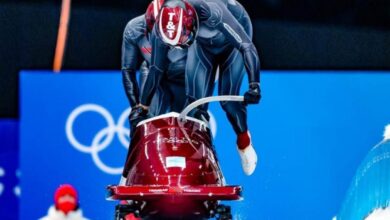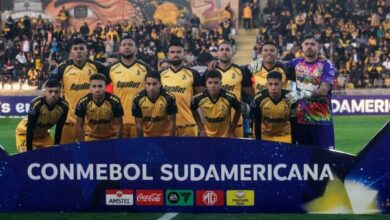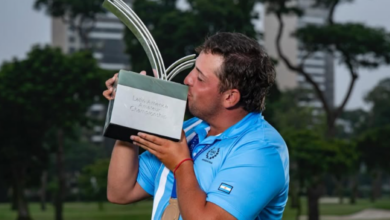The Refugees have also a team for Tokyo 2020 Olympic Games
The initiative, which was born for the Rio de Janeiro 2016 event with 10 athletes, has been consolidated in Tokyo 2020 with the participation of 29 athletes, including a Venezuelan. Who are they? and Why was this team formed?.

The International Olympic Committee (IOC) in 2016 decided to create a refugee team to offer these high-performance athletes affected by the aforementioned crisis the opportunity to attend the Olympic event. Photo: Olympics
LatiAmerican Post | Onofre Zambrano Moreno
Escucha este artículo
Leer en español: Los Juegos Olímpicos Tokio 2020 de los refugiados
They enjoy and compete as one more. Although their hearts continue to beat for their birth countries, their Olympic reality changed and today they are part of another group of athletes, who have their own flag and who are just in their second Olympic participation , the second of many in a row? We do not know yet.
The International Olympic Committee (IOC) decided to create by order of its president, Thomas Bach, and for the last Olympic Games in Rio de Janeiro 2016, a team of refugees to offer these high-performance athletes affected by the aforementioned crisis the opportunity to attend the Olympic event.
Also read: Infographic: Tokyo 2020's Most Amazing Olympic Moments
The first refugee selection was made up of 10 athletes five years ago . In the group were two Syrian swimmers, two judokas from the Democratic Republic of the Congo, a marathoner from Ethiopia and 5 middle distance runners from South Sudan.
For the Tokyo edition, the Olympic Refugee Team was made up of 29 athletes from 11 countries and competed in 12 disciplines, including athletics, badminton, boxing and swimming, among others.
The other novelty for this year was represented by the Venezuelan boxer Eldric Sella Rodríguez, the first Spanish-speaking athlete to be part of this initiative . Sella was eliminated from Olympic boxing in the first substitution by his opponent from Trinidad and Tobago.
The 29 athletes that make up the Refugee Team are originally from Afghanistan, Cameroon, Eritrea, Iran, the Democratic Republic of the Congo, Syria, South Sudan and, as we have already said, from Venezuela.
Venezuela! El púgil capitalino y atleta refugiado Eldric Sella desfiló en sus primeros JJOO con el equipo olímpico de Refugiados.
Esto también es ???????? pic.twitter.com/HUKxopbb2b
— Andrés Henríquez (@alejohtkd) July 23, 2021
How does it work?
Filippo Grandi, UN High Commissioner for Refugees, noted in March 2016: “Their participation in the Olympics is a tribute to the courage and perseverance of all refugees in overcoming adversity and building a better future for themselves and their families. UNHCR is with them and with all the refugees, ”published UNHCR.
According to the International Rescue Committee (IRC), an organization that provides aid to refugees, asylees or those persecuted for ethnic, political or religious reasons, in 2015 the IOC also established an Emergency Fund for Refugees of US $ 1.9 million so that people with this status join professional sports.
The athletes of this team receive a scholarship and, after Rio-2016, two million dollars have been invested in these refugee athletes . "The creation of the refugee team sent a message of hope and inclusion to millions of refugees around the world," the organization said at the time, UNHCR reflected.
In 2012, Guor Marial, a refugee marathoner in the US, participated in the London Games as an independent athlete . He fled Sudan, but did not have American nationality and South Sudan, an independent nation, did not yet have an Olympic committee.
The athletes of this team parade behind the Olympic flag . Their routines are different and, in fact, if any of their members obtain a medal, the flag that is raised is that of the five rings to the sound of the Olympic anthem.
The Olympic team code – the three letters that appear to designate nationality – is 'EOR', for Olympic Refugee Team . The team was the second to parade at the opening ceremony.
EOR sent a message of solidarity and hope during a refugee crisis of 82.4 million people who have been forcibly displaced around the world, according to figures from the United Nations High Commissioner for Refugees (UNHCR).
Those from Rio
In the games in Brazil competed: The Syrian Rami Anis swimmer in the 100-meter butterfly; middleweight judoka Yolande Mabika , 28, from the Democratic Republic of the Congo; Paulo Amotun Lokoro, 24, from South Sudan, in the 1500 meters.
Others who made up that team in 2016 were Yusra Mardini, 18, a 200-meter freestyle swimming athlete from Syria ; Yiech Pur Biel , 21, South Sudan, running the 800-meter sprint; former soccer player Rose Nathike Lokonyen (23) also from South Sudan and 800 meter competitor; and Popole Misenga (24) of the Democratic Republic of Congo at middleweight judo.
That group was complemented by the Ethiopian Yonas Kinde, 36 , in the marathon; also Anjelina Nadai Lohalith (21) from South Sudan for 1,500 meters; and James Nyang Chiengjiek (28) also from South Sudan for the 800 meters.
Esta increíble nadadora, Yusra Mardini, que compite en los #JJOOTokio2020 por el equipo de refugiados, huyó de la guerra en Siria, cruzó en patera el Mediterráneo, durante el viaje, el bote se estropeó y no dudó en empujarlo a nado durante 3h con su hermana, salvando a 17 vidas. pic.twitter.com/TQAhrPmSrX
— Carolina Alonso (@Carolalon1) July 27, 2021
The ones from Tokyo
The Venezuelan boxer Eldric Sella Rodríguez; also from Afghanistan are Belgian-based taekwondoka Abdullah Sediqi and judoka Nigara Shaheen, who now lives in Russia , as well as cyclist Masomah Ali Zada who now lives in France.
On behalf of Syria appear the cyclist Ahmad Badreddin Wais; the judokas Muna Dahouk, Sanda Aldass and Ahmad Alikaj; the swimmers Alaa Maso and Yusra Mardini; badminton player Aram Mahmoud; the karate fighter Wael Shueb; and boxer Wessam Salamana.
Also making up the group of these games are the Iraqi fighter Aker Al Obaidi, the Sudanese Nyang Chiengjiek and Anjelina Nadai Lohalith of athletics; and boxer Jamal Abdelmaji. Cameroonian weightlifter Cyrille Fagat Tchatchet II; from Iran stand out the karate fighter Hamoon Derafshipour and the judo fighter Javad Mahjoub; as well as the canoeist Saeid Fazloula; Dorian Keletela from Athletics compete for Republic of the Congo and repeats the judoka Popole Misenga .




